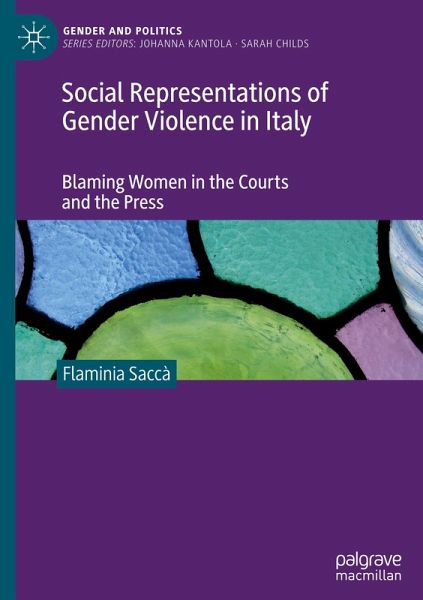
Social Representations of Gender Violence in Italy
Blaming Women in the Courts and the Press
Versandkostenfrei!
Versandfertig in 6-10 Tagen
91,99 €
inkl. MwSt.
Weitere Ausgaben:

PAYBACK Punkte
46 °P sammeln!
This volume illustrates and analyses the stereotypes and prejudices underlying the social representation of violence against women as it is narrated and described in Italy by the press and by court judgements. After a theoretical reflection on the role of culture and socialisation in reproducing the conditions underlying gender-based violence and its normalisation, and after reconstructing the historical evolution of gender roles and the stages of women's condition, the book presents the results of a sociological and of a socio-linguistic analysis on a vast corpus of 16,715 newspaper articles ...
This volume illustrates and analyses the stereotypes and prejudices underlying the social representation of violence against women as it is narrated and described in Italy by the press and by court judgements. After a theoretical reflection on the role of culture and socialisation in reproducing the conditions underlying gender-based violence and its normalisation, and after reconstructing the historical evolution of gender roles and the stages of women's condition, the book presents the results of a sociological and of a socio-linguistic analysis on a vast corpus of 16,715 newspaper articles published by fifteen Italian newspapers on gender crimes (specifically: femicide; sexual violence; domestic violence; women trafficking) . The chapters analyze how national, macro-regional and local Italian press narrates violence against women but they also analyze a repertoire of 283 judicial sentences. The results show a clear tendency to redistribute the responsibilities of these crimes between the perpetrator and the victim, leading not only to secondary victimization but also to tertiary victimization, affecting the quality of Italian institutions as well as the democratic fiber of the nation.
The volume finally includes a compendium of the best and the worst practices found in the corpuses of sentences and newspapers' articles and a set of recommendations addressed to the institutional actors and journalists for a correct representation of gender-based violence, free from those stereotypes and prejudices that violate the dignity of male violence' victims and prevent them from accessing justice.
The volume finally includes a compendium of the best and the worst practices found in the corpuses of sentences and newspapers' articles and a set of recommendations addressed to the institutional actors and journalists for a correct representation of gender-based violence, free from those stereotypes and prejudices that violate the dignity of male violence' victims and prevent them from accessing justice.












